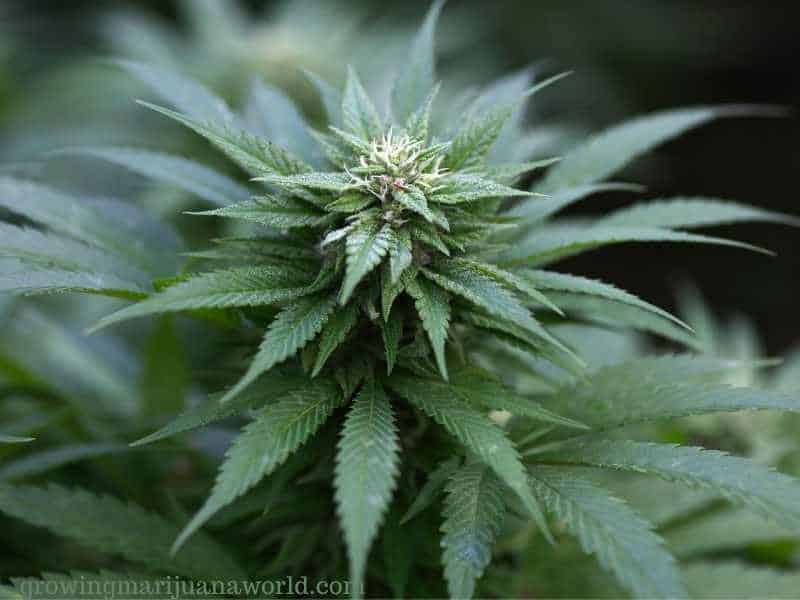Can You Use Compost for Weed Plants?
It’s no secret that marijuana growers are getting better at optimizing each new cannabis plant they grow. They know what type of lights are best, what temperature and humidity are required, and how often to water their plants – just like mad scientists! Fertilizing marijuana plants to increase the size and quality of buds has become an important part of growing ‘good’ weed.
Yes, you can use compost on weed plants. Using your own compost will be important so you know what the compost contains. This is important as the contents of your compost pile will affect quality and taste of the buds. Consider having the makeup of the compost be 50% green materials and 50% brown materials.
If you’re not sure what green and brown materials are when talking about compost, I recommend you read this article in its entirety. As a cannabis grower myself, I take pride in ensuring the compost I use will work well for my plants. In this article, I’m going to discuss the benefits of and when to use compost. I’ll also cover using manure and tea compost.
Okay, let’s begin!
The Benefits of Using Compost on Weed Plants
With the increasing popularity of marijuana among both consumers and growers, most people develop personal favorites and enjoy the unique tastes and effects of each strain. Fertilizing with compost can add unique flavors and aromas to your marijuana.
Cannabis enthusiasts want to use strains made from natural, healthy ingredients — and organic compost may just offer the best choice for organic cannabis cultivation. Composting has several benefits when used for growing cannabis.
- Feeding compost to weed plants during the vegetative stage can help strengthen the plants stalk.
- By strengthening the stalk compost, you’ll also help to further maximize the size of the yield achieved.
- Because compost is a natural fertilizer, it can help improve the taste of your weed. Using commercial fertilizers can sometimes cause the plants to have a chemical taste if not used properly.
How to Start Composting for Weed Plants
It’s imperative to balance out the types of materials you place in your compost bin, in terms of green and brown materials. It’s imperative to ensure the bacteria and microorganisms in the compost have the right conditions and environment to thrive.
Compost has two main categories: organic material and inorganic material. The first category is known as green materials which includes grass clippings, leaves, fruits, and vegetables. The second category is known as brown material and includes things like woodchips, dead leaves, paper, cardboard, and straw.
The compost pile should consist of 25–50% grass clippings, leaves, and other green materials, with the remainder being wood chips, sawdust, and other brown materials.
When composting, it’s best to do it during warmer months and on sunny days because the chemical process slows down when temperatures drop and freezing weather occurs.
During colder seasons, you can create your own compost by using a compost bin, but most people aren’t growing their own plants outdoors during these times. Therefore, it’s best for you to focus on creating your compost during the warmer spring and summer months.
You can keep a separate pile of organic material for composting over a longer time which is known as cold composting. You just need to collect your yard waste and organics and put them in a separate pile or container. You can move this indoors to a garage or basement if your region gets below zero in the winter.
It takes up to a year for organic material to fully decompose in cold climates. However, it requires less maintenance than composting in warmer climates. That’s something to think about if you’re looking for something that is less maintenance.

When to Use Compost for Growing Weed
Composting and fertilizing are both good for your plants, but they have different effects on them. Composting is a way to improve the quality of soil by encouraging beneficial microorganisms to grow.
You can buy a compost mix or make a compost yourself. Adding green materials such as grass clippings, coffee grounds, and teabags will encourage the production of nitrogen in the soil. Nitrogen is required for microorganisms to grow in the soil.
Other factors, including water retention, air circulation, and fungi balance, will also affect how your weed plants grow.
After your compost has been ready for some time, the amount you’ll use depends on the nutrient levels and quality (or lack thereof) of your existing soil. Usually just topping off the area around the base of the plant is enough to improve the health of the soil and create optimum growing conditions.
For those cultivating organic cannabis, composting is an important process. It’s not only beneficial for your plants during their life cycles, but the composting can also benefit the environment by responsibly eliminating wastes.
Benefits of Using Manure for Weed
Manure brings many benefits to the garden, including fertilization, weed suppression, and pest control. Whether you’re growing weed or something else, you’ll benefit from good soil and healthy plants.
Manure improves soil structure which is extra beneficial if you’re growing weed outdoors. To further improve the effect of using manure, try adding mulch as well. Mulching with manure protects the soil beneath it from erosion and increases the water retention a bit longer.
Manure provides organic carbon to soil microbes which, in turn, use it as an energy source. By feeding these tiny populations, we’re helping plants grow bigger and healthier. Bacteria and fungi often form a symbiotic relationship within plants. Some of them fix atmospheric nitrogen and make it available for plants, and some break down organic matter into nutrient-rich soil.
Manure provides plants with essential nutrients they need to grow and thrive. Plants need nitrogen to build proteins and essential enzymes. Organic nitrogen is an important nutrient for plants. It’s released slowly from manure over time. Commercial marijuana fertilizers contain high levels of nitrogen and nitrogen dissolves quickly into water and leach out of the soil.
How Much Manure Does Cannabis Need?
There are many benefits of using manure in the garden. However, how much should be used depends on the type of soil you’re working with. Soil that has peat moss and other additives won’t need as much manure.
If you’re working with almost 100% soil with no additives, add a bit more manure. You don’t want to have the soil feel like clay, but you also don’t want it to be so loose it feels like sand. Shoot for somewhere in-between.
Adding a generous amount of manure to the soil will help you establish the grow area, feed your plants, improve moisture content, and promote microbial life.
This applies mostly to outdoor grow areas but after growing in the same bed for 2 or 3 years you can greatly lessen the amount of manure added to the soil. Some professional growers prefer to till the manure and compost into the soil whereas others recommend spreading it on top and leaving it over the winter. Once spring arrives, the manure should be worked into the soil a bit.
How To Use Compost Tea for Weed Plants
If you’re interested in learning more ways to improve your weed plants organically up next we can talk about how to grow organic cannabis using compost tea.
The nutrients and microorganisms found in the compost eventually end up dissolved in the water and the resulting product is like that of an organic liquid fertilizer. The nutrients soaked out of the compost are like a super food for your weed plants. Compost tea is the best way to boost your cannabis plant’s growth.
You can apply compost tea to your weed plants daily if you want – it’s no different than if you have added the compost directly to the soil.
Compost tea can be used to enhance plant growth when grown organically. Keep in mind that compost tea shouldn’t be a replacement for the additional nutrients your weed plants require. You can still provide commercial fertilizers unless you’re wanting to grow organically.
The Benefits of Using Compost Tea on Weed Plants
Compost tea shouldn’t be used in place of fertilizer, but it can be used to compliment and boost the microbial life in the soil. Doing so will help feed your plants nutrients directly and take care of the microorganisms in the soil. This breaks down and makes nutrients available for your weed plants.
Compost tea enhance nutrient uptake, so it’ll improve root growth and keep your medium nutrient rich. Microbes will break down the nutrition in the soil for your plants allowing it to become much more bioavailable.
Compost teas are completely organic because they use only natural ingredients. They’re not contaminated by chemicals or pesticides.
Compost tea brings a lot of benefits into the garden. Whether you’re growing cannabis or vegetables its beneficial to use.
When you make your own compost tea it should be well-aerated. This’ll provide a healthier soil for the plant’s roots.
The materials you need to make compost tea can usually be found right in your home. This makes the process more desirable to do. It also helps save you a few dollars.

How to Make Compost Tea
How do you make compost tea? Compost teas are made by soaking compost in water, that’s it. See below for further explanation.
Compost tea is very simple to make. A word of caution before we start. Make enough to use and don’t have leftovers. The microorganisms will die off if they don’t get applied to soil with 36 hours of making the tea. Let’s get started.
You’ll need the following supplies: 5-gallon pail, an air-stone and air pump just like one you would use in an aquarium, a large mesh bag or pair of pantyhose.
Here are 4 easy steps to follow – these include the following:
- Fill the pail 3/4 full of lukewarm or room temperature chlorine free water. To achieve chlorine free water, use water that was sitting out in the pail for 24 hours. Chlorine will kill the microorganisms so its important to do this right.
- Hook up the air-stone and air pump and place the air stone in the pail. You want to have oxygen in the water, so the microorganisms stay alive.
- Next, fill your large mesh bag or pantyhose with compost. Place the bag/pantyhose in the pail. If you can set it up so it hangs into the water without floating on the bottom, that would be best.
- Top up the water if you want. Leave the pail now for 24 to 36 hours in a warm location. I wouldn’t let it sit for much longer than this.
After 36 hours, take everything apart and pour the compost tea freely around your weed plants.
I know some growers who make their own compost tea recommend heating up the water for 24 or more hours. I understand what they’re trying to achieve however, I have a problem with this approach.
If you heat up the water, it’s not the temperature the microorganisms are used to. I feel this’ll potentially kill a lot of the organisms off. I could be wrong but then again, I could be correct.
Final Thoughts
There are many benefits to using compost for weed plants. It improves the health of your soil which can mean better yields and potentially less disease. A bonus is it also helps prevent weeds from taking over your garden. It’s also good for the environment and helps reduce the amount of waste going to landfills.
So, next time you think about adding compost to your weed plants, do it – it’s a great way to add nutrients back into the soil and improve your cannabis yields.
Thanks for reading and good luck!
Recommended Posts
How to Water Pot Plants (for Maximum Yield)
How Often Should I Feed My Weed Plants Nutrients? (For Bigger Yields)









